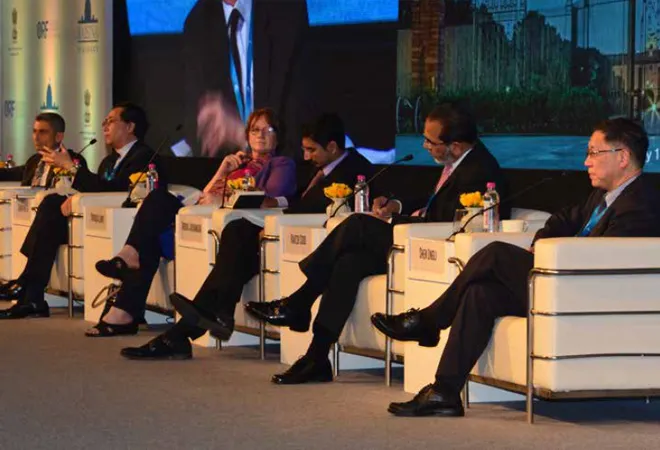-
CENTRES
Progammes & Centres
Location
If military strength is the final argument in international politics, nuclear weapons are its most emphatic manifestation.

Image Source: Photolabs@ORF
The global geostrategic landscape is undergoing major upheavals. For one, the rise of China is forcing many states in Asia to revaluate their strategic priorities. Simultaneously, the US is undergoing a process of retrenchment from global politics. If the global balance of power is witnessing a transition, many other states are trying to adjust to a more chaotic international
system.
The consequences result of these changes can be witnessed in the increasing reliance upon the use or the threat of use of force in international relations. In a world that is growing anarchic by the day, force is once again increasingly being accepted as the ultima ratio in interstate behaviour.
Panellists during a discussion on “New Strategic Order: Nuclear Conundrum” established that if military strength is the final argument in international politics, nuclear weapons are its most emphatic manifestation. The current global disorder, therefore, has consequences for the global nuclear order. These are mostly manifested in three distinct tendencies. First, after a long time, nuclear weapons are increasingly becoming acceptable among states as the ultimate guarantor of security and sovereignty. This trend is not only visible in Asia but is now spreading across Europe too. Second, if the Cold War ushered nuclear competition among major nuclear powers, it was also underlined by major successes in controlling the negative spirals of arms race through arms control. In the current scenario, however, prospects for arms control appear completely frozen. Lastly, the accompanying nuclear doctrinal changes among some new nuclear weapon states suggest instrumental importance of nuclear weapons exceeds political value.
From Japan to South Korea to Germany, nuclear weapons are now being debated and discussed in a manner inconceivable a decade earlier. There is a growing realisation among close defence allies of the US that Washington is recalibrating its defence commitments, including its extended nuclear deterrence. The new Trump administration has left no stone unturned to indicate its growing impatience with its allies in Asia and Europe. As the new US government seeks greater defence commitments from allies, it also engenders certain incentives for them to acquire independent deterrents. In fact, during the Cold War, many of these states had bartered their strategic autonomy — including the choice to build nuclear weapons —in lieu of America’s security commitments.
If US retrenchment is one factor, American allies are also becoming increasingly suspicious of Washington’s credibility in deterring nuclear dangers posed by outliers such as North Korea and Iran. Or, as one Korean commentator put, “What leverage does US President Donald Trump have to basically dissuade Pyongyang?”
Nuclear vulnerability of American allies is, therefore, on the rise. As the allies’ faith in US nuclear guarantees fades, so would their reasons to eschew an independent nuclear deterrent. If nuclear non-proliferation is the first casualty of the evolving global disorder, arms control is another.
To paraphrase nuclear physicist and arms control expert Patricia Lewis, arms control in the present context appears to be in “terrible situation.” Unlike the era in which the nuclear non-proliferation regime evolved, today’s global context is devoid of any great power consensus over the need and desirability of global arms control regimes. Instead, one witnesses an arms race where nuclear-weapon states are trying to outwit each other through incorporation of new weapon systems. If the US is employing ballistic missile defence, China is focusing on longer range missiles with multiple warheads, hypersonic glide and nuclear submarines. Russia, meanwhile, is not only increasing its nuclear arsenal but also testing new missiles. The arms race, however, is not restricted to these major nuclear-weapon states. Even within smaller nuclear powers, such as Pakistan and India, a technological race is quite evident, including a naval nuclear build-up in the Indian Ocean.
India is the only nuclear weapon state that says that we are fully committed towards elimination of nuclear weapons in a verifiable, multilateral manner. — Rakesh Sood, Distinguished Fellow, Observer Research Foundation
Though most historians and analysts ruminated over the fallacy of nuclear war-fighting doctrines after the Cold War, use of nuclear does not appear to have gone completely out of vogue. In fact, states are increasingly relying upon the first use of nuclear weapons in their defence strategies. North Korea is one such example. Pakistan, too, has time and again referred to the use of tactical nuclear weapons as a natural first response in case of a conventional conflict with India. The taboo over the use of nuclear weapons, in the post-Hiroshima period, appears too frail to be of much consequence in the emerging geopolitical landscape.
Clearly, the description of the second nuclear age does not entirely capture the emerging nuclear disorder. Rather, the current scenario indicates a repeat of the Cold War nuclear instability, devoid of its stabilising elements, especially those of the arms control measures. If strategists are talking about a Cold War 2.0, it is most emphatically manifested in what can only be called the third nuclear age—which promises to be far more unstable than the Cold War but will once again reinforce the utility of nuclear weapons in the anarchic and competitive landscape of international politics.
The views expressed above belong to the author(s). ORF research and analyses now available on Telegram! Click here to access our curated content — blogs, longforms and interviews.

Yogesh Joshi is a research fellow at the Institute of South Asian Studies National University of Singapore. ...
Read More +